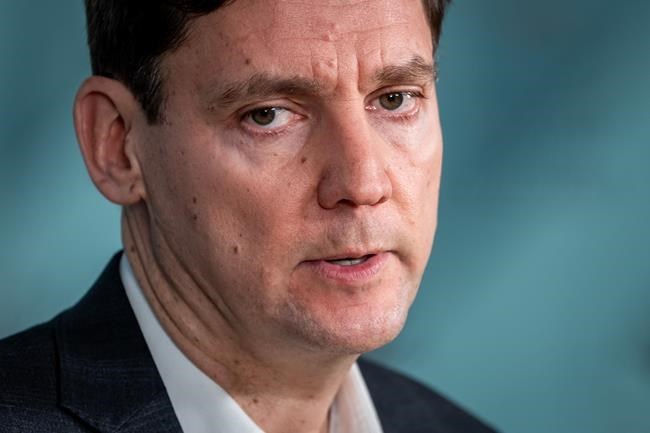
British Columbia Premier David Eby speaks during a news conference in Vancouver, on Tuesday, Jan. 7, 2025. Eby says U.S. president-elect Donald Trump has made a "declaration of economic war" on Canada and B.C. with his proposed 25 per cent tariffs on Canadian goods. THE CANADIAN PRESS/Ethan Cairns
Republished January 16, 2025 - 4:52 PM
Original Publication Date January 16, 2025 - 10:31 AM
VANCOUVER - Premier David Eby said British Columbia families face a direct threat from U.S. president-elect Donald Trump's "declaration of economic war" with his proposed 25 per cent tariffs on Canadian goods.
"It is an attack on families in our province. It is an attack on Canadians,” Eby said at a news conference on Thursday to unveil forecasts about a potential trade war that included tens of billions in lost GDP and soaring unemployment in the province.
“Our No. 1 priority is ensuring that we are prepared as a province for these tariffs and that we are responding in a way that protects families and ensures that we minimize the risk of any future attack like this from the United States,” Eby said.
The costings suggest the tariffs and a similar response from Canada would cumulatively cost the province $69 billion in lost GDP if the trade war lasts the entire four years of the Trump presidency.
The costings estimate 124,000 fewer jobs in the province by 2028, and forecast that the unemployment rate would rise to 7.1 per cent next year.
The preliminary assessment by the Ministry of Finance also suggests corporate profits in B.C. would decline $6.1 billion this year.
Finance Minister Brenda Bailey said the tariffs are unprecedented in modern times, and cautioned that this made forecasting difficult.
She said B.C. has a relatively diversified export market compared with other provinces such as Alberta, Ontario and Quebec, where the U.S. buys more than three-quarters of exports. In 2023, B.C. sent about 54 per cent of its exports to the United States, Bailey said.
While this will help insulate B.C. from the Trump tariffs, they would still trigger "significant impacts" for the B.C. economy, she said.
What most Canadians initially hoped to be a "passing fancy" in November when Trump initially threatened on social media to slap a 25 per cent tariff on Canadian goods, is now being taken very seriously, Eby said.
All provincial cabinet ministers have been directed to focus on growing B.C.'s economy and protecting vital public services in the face of the "unprecedented threats," the premier said.
Eby said he aims to strengthen the provincial economy by accelerating permits, pushing Canada to remove internal trade barriers between provinces and making use of B.C.'s natural advantages. These include being on the Pacific Ocean as well as being home to critical minerals and metals that are needed globally.
The province is working with Alberta to remove internal trade barriers around electricity and energy, Eby said.
Eby said that "perhaps we can turn this threat into an opportunity for all Canadians to increase our prosperity and reduce our dependence on the United States."
Bryan Yu, chief economist for Central 1 Credit Union, said the province's financial estimates are "reasonable," while noting that there is a lot of uncertainty around the threatened tariffs.
He said there could be benefits to increasing interprovincial trade.
Werner Antweiler, an economics professor at the Sauder School of Business at University of B.C., agreed that provincial trade barriers should be removed.
“That has been a missed opportunity for a generation and longer. Maybe this is a wake-up call to also look at internal trade and realize the full potential of internal trade opportunities,” Antweiler said.
Antweiler said he's not optimistic about the province’s efforts to increase exports to countries such as India and South Korea as “trade gets more difficult the further away the trade partner is.”
B.C. industries that are likely to be the most affected by tariffs are lumber and farming, with the exception of dairy, he said.
On Tuesday, Ontario Premier Doug Ford released estimates that 25 per cent tariffs on Canadian goods could cost 450,000 to 500,000 jobs in that province, depending on which sectors are targeted.
Prime Minister Justin Trudeau has meanwhile assembled a new Canada-U. S. relations council to support the federal government as it deals with the incoming Trump administration's proposed tariffs.
This report by The Canadian Press was first published Jan. 16, 2025.
News from © The Canadian Press, 2025